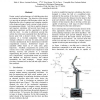Free Online Productivity Tools
i2Speak
i2Symbol
i2OCR
iTex2Img
iWeb2Print
iWeb2Shot
i2Type
iPdf2Split
iPdf2Merge
i2Bopomofo
i2Arabic
i2Style
i2Image
i2PDF
iLatex2Rtf
Sci2ools
ICRA
2002
IEEE
2002
IEEE
Design and Control of a Three-Link Serial Manipulator for Lessons in Particle Dynamics
Design, control, and performance of a ball-throwing robot are examined in this paper. The objective of this project is to provide an interactive ball-throwing robotic arm for illustrating the roles of engineers and computer scientists in the design and usage of such a system to high school or pre-engineering students. Activities in particle dynamics and trajectory calculation will provide basic hands on engineering experience and the opportunity to interact with the robot. In order to effectively provide this activity, the robot must consistently throw the ball from a known point with a desired velocity. This requires a minimum of a two-link manipulator with control strategies sufficient to converge two joint positions and velocities simultaneously. Due to limited micro-controller computational resources, feed-forward torques are calculated offline based on 3rd order cubic spline trajectories. Feedback compensation for position and velocity error is then examined and compared for ball...
Ball Throwing Accuracy | Ball-throwing Robotic Arm | Cubic Spline Trajectories | ICRA 2002 | Robotics |
| Added | 15 Jul 2010 |
| Updated | 15 Jul 2010 |
| Type | Conference |
| Year | 2002 |
| Where | ICRA |
| Authors | Mark A. Minor, Kent Jensen, Youngshik Kim |
Comments (0)

